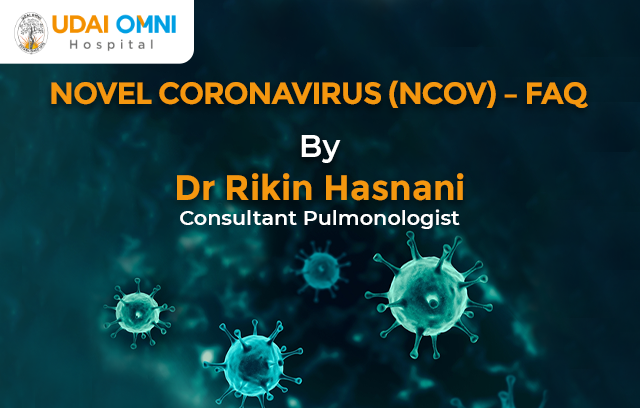Novel Coronavirus (nCoV) – FAQ
What is Coronavirus?
Coronaviruses are a family of viruses that infect both animals and humans. Human coronaviruses can cause a mild disease similar to a common cold, while others cause more severe diseases (such as MERS – Middle East Respiratory Syndrome and SARS – Severe Acute Respiratory Syndrome).
Some coronaviruses that are found in animals can infect humans – these are known as zoonotic diseases.
What is known about the disease that identified first in Wuhan, China?
It is caused by a novel coronavirus (called 2019- nCoV).
- Infection with this virus causes respiratory diseases ranging from mild to severe diseases.
- Some infected patients have died from infection (people with underlying medical conditions are more at risk for severe disease and death).
What is NOT known about the disease?
- Where it came from?
- How easily does it spread between people?
- Who is vulnerable to infection?
What is the situation of Current outbreak?
- 1st case was detected on December 12
• Cases were linked to a Seafood Market in Wuhan City China Dec 2019
• As of January 30 Total of 7,711 confirmed cases in mainland China,
• A total of 170 people have died. - Thailand has reported 14 cases of infection; Japan has 11; Hong Kong and Singapore have 10; Taiwan has 8; Australia, Malaysia and Macau each have 7; France has 5; South Korea, Germany and the United Arab Emirates each have 4; Canada has 3; Vietnam has 2; Nepal, Cambodia, Sri Lanka and Finland each have 1.
- 1st case in India is reported on 30 January 2020.
What are the symptoms of coronavirus infection?
Symptoms of nCoV infection include fever, cough and shortness of breath. Other symptoms may include nausea, vomiting and diarrhoea.
How does nCoV differ from common flu?
Common flu and nCoV differ in the severity of diseases and rapidity of spread. Mortality rate i.e., no. of patients killed due to flu is 1 in 1000, SARS killed 1 in 10, while MERScoV killed 1 in 3. The data for nCoV is not known yet but preliminary results suggest it is less severe than SARS.
What are the preventive measures you should take?
At home:
- Frequently clean hands by using alcohol-based hand rub or soap and water.
- Cover mouth and nose with a medical mask, tissue, or flexed elbow when coughing or sneezing.
- Wash hands afterwards and discard mask or tissue.
- Avoid unprotected close contact with people with fever and cough and seek medical care if you have a fever, cough and difficulty breathing.
- When visiting live markets, avoid direct unprotected contact with live animals and surfaces in contact with animals.
- If you become sick while travelling, inform the crew, seek medical attention early and share travel history.
What precaution you should take if you’re travelling?
Before you depart:
Avoid travel if you have a fever and cough. If you have a fever, cough and difficulty breathing, seek medical attention and share previous travel history with your health care provider.
During travel:
- Avoid close contact with people suffering from a fever and cough.
- Frequently wash hands by using alcohol-based hand rub or soap and water.
- Avoid touching eyes, nose or mouth.
- Cover mouth and nose with a tissue or flexed elbow when coughing or sneezing and wash hands afterwards.
- If you choose to wear a face mask, be sure to cover your mouth and nose. Avoid touching the mask once it’s on and immediately discard the single-use mask after each use. Wash your hands after removing masks.
- If you become sick while travelling, inform the crew and seek medical attention.
- If you seek medical attention, share your travel history with the health care provider.
What precautions are to be taken if you’re working with live animals?
- Wash your hands with soap and water after touching animals and animal products.
- Avoid touching your eyes, nose or mouth.
- Avoid contact with sick animals and spoiled meat.
- Avoid contact with stray animals, waste and fluids in the market.
- Avoid direct and unprotected contact with live animals and the surfaces in contact with the animals.
- Disinfect equipment and working area at least once a day.
- Wear protective gowns, gloves and facial protection while handling animals and fresh animal products.
- Remove protective clothing after work, wash them daily and leave them at the worksite
- Avoid exposing your family members to soiled work clothing and shoes.


